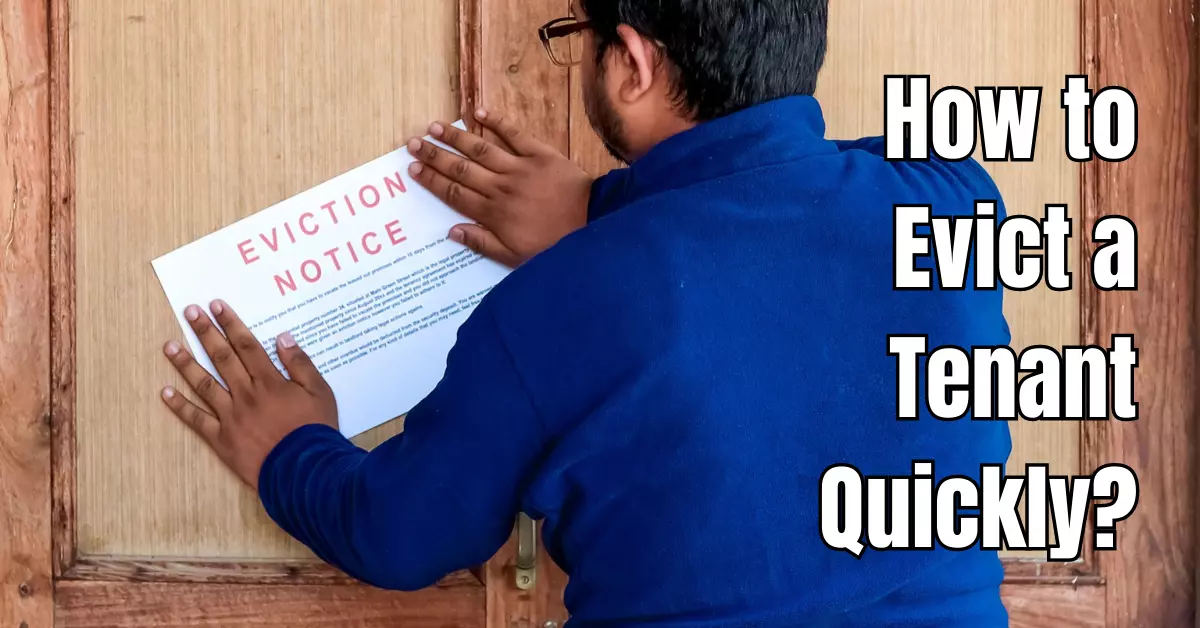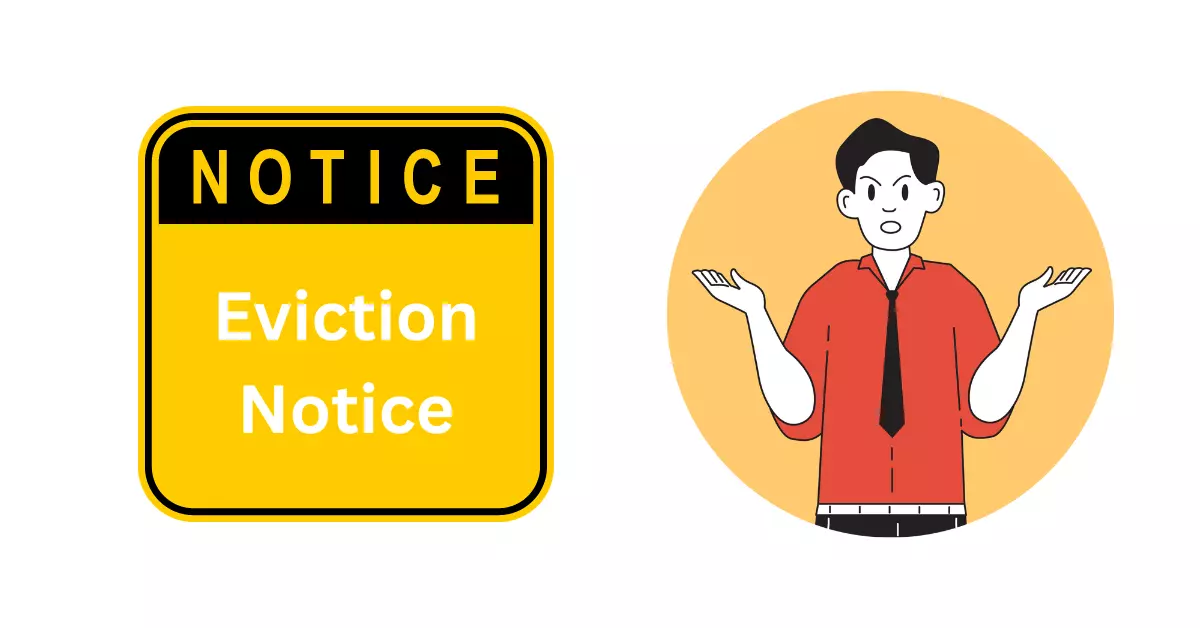To evict a tenant quickly, a landlord must follow proper legal procedures and provide written notice. Failure to comply with these procedures can result in delays and even legal consequences.
Unfortunately, there are circumstances that might require you to evict a tenant. Evicting a tenant can be stressful, time-consuming, and costly.
However, with the proper legal procedures and documentation, it is possible to evict a tenant quickly. This article will provide everything you need to know to evict a tenant quickly and efficiently.

Understanding Tenant Rights And Laws Governing Evictions
As a landlord, understanding tenant rights and the laws governing evictions is crucial to ensure you act within the legal framework and avoid future legal complications or disputes.
How do Eviction Laws Differ From State To State?
Eviction laws vary from one state to another. Therefore, it’s crucial to understand the regulations governing evictions in your state.
Here are the differences you need to know:
- Some states require landlords to have a reason to evict a tenant, whereas some states allow for a “no-cause” eviction.
- Some states have longer eviction timelines, while others have relatively short ones.
- Some states require landlords to provide a notice of eviction, while others do not.
- In some states, tenants have the right to cure the issue leading to eviction, while in others, they don’t.
The Importance Of Understanding Tenant Rights
Understanding tenant rights enlightens you on the tenant’s legal entitlements and ensures that you don’t breach any of their rights. Knowing the tenant’s rights would also help:
- In making legal decisions related to evictions.
- To prevent breaking any laws unintentionally, which may attract legal action against you.
- You communicate with your tenant effectively.
List The Different Reasons Why A Tenant Can Be Evicted
There are various reasons why a tenant can be evicted, ranging from damaging property, not paying rent, and violating the lease agreement.
Here are the different reasons why you can evict your tenant:
- Non-payment of rent.
- Violation of lease agreement.
- Property damage or endangerment.
- The tenant’s criminal activity on the premises.
- The tenant hasn’t renewed the lease.
- Illegal behavior in the tenant’s premises.
Initial Notices And Steps

How To Begin The Eviction Process
Evicting a tenant is a daunting task for landlords, but sometimes it becomes a necessary step for any number of reasons.
You might choose to proceed with an eviction case when the tenant is not paying rent on time, breaching the lease agreement, or damaging your property.
To begin the eviction process, you need to make an initial notice to tenants. Here are a few key steps to follow:
- Write a clear and concise notice to the tenant that states the reason for the eviction.
- Send the notice in writing or hand-deliver it by certified mail with a return receipt requested.
- The notice must give the tenant a specific amount of time to fix the problem, and if the tenant fails to do so, then you can move forward with legal action.
The Timeline: Notice Requirements
Landlords are required to give tenants a certain amount of notice before they can take any legal action.
The amount of time necessary for the notice period will differ by state, but it typically ranges from 3 days to 30 days.
- Consult local laws and regulations to determine the number of days notice you are required to give to tenants before filing an eviction lawsuit.
- Give the tenant ample time to address the issue. You need to follow specific notice requirements to terminate the lease agreement.
Legal Notices That Should Be Served
It’s crucial to ensure that all necessary legal notices are served correctly to the tenant when seeking to evict a tenant.
There are several types of eviction notices that landlords can use, so it’s essential to choose the right one that aligns with your situation.
Some common eviction notices include:
- Pay rent or quit notice: Lets tenants know that they have a specific time period to pay their rent or vacate the premises.
- Cure or quit notice: Requires the tenant to cure the violation, such as removing unauthorized occupants or ceasing illegal activities.
- Unconditional quit notice: This notice gives no chance to cure the violation and automatically ends tenancy.
Sending the appropriate notice is a critical step in the eviction process. Make sure to review your local laws to ensure that you are following all the required steps.
Filing For Eviction With The Court
Filing for eviction with the court can be a daunting process, but it is often necessary when dealing with troublesome tenants.
Let’s guide you through the step-by-step process of filing for eviction and what to expect in court.
Explain The Step-By-Step Process Of Filing For Eviction With The Court
To begin the eviction process, the landlord must serve the tenant with a notice to vacate, giving them a set number of days to leave the property.
If the tenant fails to vacate by the specified date, the landlord can then file for eviction with the court.
The following steps will guide you through the process of filing for eviction:
- Fill out the appropriate eviction forms for your state and county.
- File the forms with the appropriate court and pay the filing fee.
- Serve the tenant with a copy of the eviction forms and a notice of the court hearing.
- Attend the court hearing and state your case for eviction.
- If granted, obtain the eviction order from the court.
- Arrange for law enforcement to physically enforce the eviction order and remove the tenant from the property.

List The Required Documents And Fees For Filing
Filing for eviction requires the appropriate forms and fees for your state and county. Here are some common documents and fees you may need:
- Notice to vacate.
- Petition for eviction.
- Summons and complaints.
- Landlord Statement of Rights and Responsibilities.
- Proof of service.
- Filing fee.
The fees for filing vary by state and county but typically range from $75 to $200.
What To Expect In Court And How To Prepare For The Hearing?
The court hearing for eviction will typically take place within a few weeks of filing. It is important to be well-prepared to present your case in court.
Here are some tips for preparing for the hearing:
- Bring all relevant documents, including the lease, notice to vacate, and any communication with the tenant.
- Dress professionally and arrive early at the courthouse.
- Be prepared to present your case clearly and concisely.
- Be respectful to the judge and other courtroom participants.
- Know your rights and responsibilities as a landlord and be prepared to answer any questions.
In court, the judge will hear both sides of the case and make a decision based on the evidence presented.
If granted, the landlord will receive an eviction order to have the tenant removed from the property.
Filing for eviction with the court can be a complex process, but with the right preparation and documentation, it can be done successfully.
Always proceed with caution and follow legal procedures to avoid any legal repercussions.
Serving The Tenant With Legal Papers
When it comes to evicting a tenant, serving the tenant with legal papers is an essential step in the process.
Let’s explain how to serve legal papers to the tenant, discuss the importance of serving the papers correctly and on time, and provide tips for handling tenant reactions and conflicts.
Explain How To Serve Legal Papers To The Tenant
Serving legal papers involves several steps. Here’s what you need to do:
- Determine which legal papers you need to serve. Depending on your location, you may need to serve an eviction notice or a summons and complaint.
- Fill out the legal papers correctly. Make sure to include all the necessary information, such as the tenant’s name and the reason for the eviction.
- Hire a process server. In some locations, only a licensed process server can serve legal papers. Make sure to check your local laws and regulations.
- Serve the papers to the tenant. This can be done in person, by mail, or in some cases, by posting the papers on the tenant’s door.
The Importance Of Serving The Papers Correctly And On Time
Serving legal papers correctly and on time is crucial for a successful eviction. Not only does it ensure that the tenant is aware of the eviction process, but it also protects the landlord from potential legal issues. Here’s why:
- Serving the papers correctly ensures that the tenant receives proper notice of the eviction process, which is required by law in most locations.
- Serving the papers on time prevents delays in the eviction process. In some cases, if the papers are not served within a certain timeframe, the eviction case may be dismissed.
- Serving the papers correctly and on time can protect landlords from legal issues, such as claims of wrongful eviction or invasion of privacy.
Provide Tips For Handling Tenant Reactions And Conflicts
Serving legal papers to a tenant can be a stressful and emotional experience for both parties. Here are some tips for handling tenant reactions and conflicts:
- Keep your cool. Stay professional and calm when serving the papers to the tenant, even if they become angry or upset.
- Be clear and concise. Make sure the tenant understands the reason for the eviction and the next steps in the process.
- Have a witness present. If possible, have a witness present when serving the papers to prevent any legal disputes about whether the papers were properly served.
- If the tenant becomes confrontational or threatening, don’t engage. Leave the property and contact local law enforcement if necessary.
By following these tips, you can serve legal papers to a tenant with minimal conflict and stress.
Remember, the goal is to complete the eviction process as quickly and efficiently as possible.
Tenant Moving Out Or Being Removed
Evicting a tenant is a difficult and unpleasant task, but sometimes it’s necessary. Whether your tenant decides to move out voluntarily or you have to go through the courts to get them removed, there are certain steps you need to follow.
Here’s what you need to know:

Explain How To Obtain A Writ Of Possession
A writ of possession is a court order that gives the landlord the right to take back possession of the property. Here’s how to obtain a writ of possession:
- File an application for a writ of possession with the court.
- Wait for the court to issue the writ of possession.
- Arrange for a bailiff to carry out the eviction.
Discuss How To Enforce The Court Order If The Tenant Fails To Move Out
If your tenant doesn’t leave the property voluntarily, you’ll need to enforce the court order. Here’s what you need to do:
- Arrange for a bailiff to carry out the eviction.
- If the tenant still refuses to leave, you may need to apply for a warrant of possession, which allows the bailiff to use reasonable force to remove the tenant and their belongings.
Highlight The Importance Of Documenting All Interactions With The Tenant
It’s essential to document all interactions with your tenant throughout the eviction process. Here’s why:
- It provides evidence that you have followed legal procedures.
- It can help you if the tenant disputes your version of events.
- It can be used as evidence in court if necessary.
Remember, evicting a tenant is a serious matter that requires careful consideration and preparation.
By following these steps and documenting your interactions with your tenant, you can ensure that the eviction process goes as smoothly as possible.
Frequently Asked Questions Of How To Evict A Tenant Quickly
How To Evict A Tenant Quickly?
If a tenant is not paying rent or holding over after the lease ends, giving notice is the first step in the eviction process.
Can I Legally Evict A Tenant Without Cause?
This depends on the laws in your state. Some states allow landlords to evict without cause, while others require a valid reason.
What Are Some Reasons For Eviction?
Some common reasons for eviction include nonpayment of rent, violating lease terms, and causing damage to the property.
How Long Does The Eviction Process Take?
The length of the eviction process varies based on state laws and specific circumstances, but it generally takes several weeks to several months.
Conclusion
Understanding the right strategies is crucial when evicting a tenant quickly. With the right paperwork, legal advice, and ensuring open communication, you’ll navigate this delicate process more smoothly.
Always keep in mind, treating tenants respectfully can make the experience less stressful for everyone involved.
